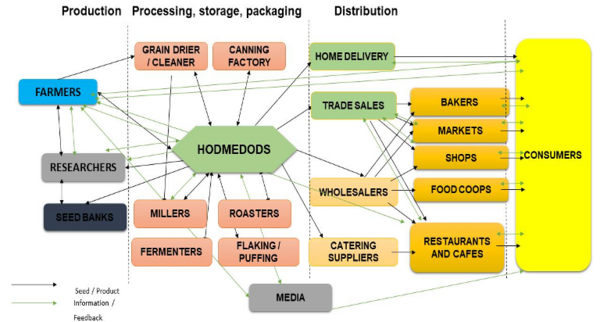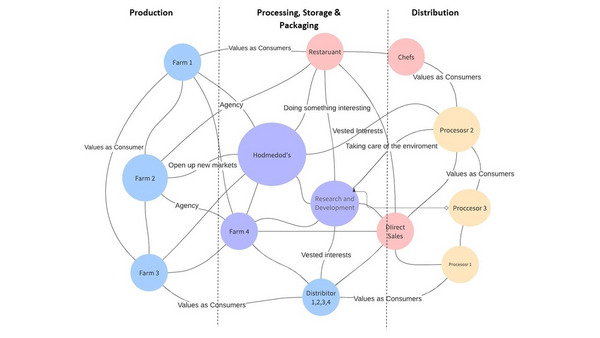Based on the case study research strategy, semi-structured interviews and a pilot case study, we conducted a value chain analysis, primarily looking at case study 15 (Growing pulses and innovative crops for a less resource intensive diet). The case study works closely together with Hodmedod’s, a company dedicated togrowing pulses locally in the UK.
The aims were to
a) map out a value chain highlighting the stages and links of production and
b) map connections and interactions between the actors (e.g. input suppliers, farmers, cooperatives, logistics providers, downstream industries and consumers) to deliver the product from its conception to the end consumer.
However, the results of the pilot study indicate that embracing crop diversification in value chains has two types of maps:
- the map of the supply chain, which illustrates the delivery of the product and
the map of the relationship network based on social values clustered around the actors and conveyed through the food from its conception to the end.
For example, Figure 1 illustrates the flow of supplies, the identification of actors from upstream to downstream and their respective activities. An interviewed participant, however, stated that “the linear way of presenting value chains is disempowering. It removes agency from the various stakeholders. So trying to demonstrate that farmers have a vested interest in the product as well as it’s production and processing reflects a lot more about the relationship (…) fundamentally”. This quote is an indication of the impact of crop diversification on value chains, particularly regarding relationships and social values. It changes the arrangements and the meaning of connections and interactions among participants.
Figure 2 indicates that from the relationship network perspective, both the products (i.e. food) and the actors have value to society. These values are wrapped around the product (i.e. food or crop) and remind the consumers that the crops were grown locally. This is seen as an attribute. These attributes shift the product out of what interviewees called “the commodity trap”. In addition, the shifting mechanism appears to be driven by rewards. Farmers are willing to put in this effort as they feel rewarded by embracing diversification, such as growing a novel crops (i.e. fava beans) that were absent from the landscape. This appeals to consumers. Farmers also see the creation of a new market for fava beans as an attribute for consumers and feel rewarded by this new market niche. Other shifting mechanisms are the role and motivations of actors. In the relationship network, farmers, bakers and processors themselves take on the role of consumers. To convey the added value of the product, the supply chain perspective comes into play. Actors and their activities already wrap the values around the product. For example, bakers and caterers post what they cooked with the product on social media, showing different ways of preparing meals. In doing so, they tag the farmer or processor, so that there is a constant feedback on the utilisation of the product. This also helps educate consumers on how to use the crop for food. In this way, the supply chain conveys these valued products to the final consumer with a narrative. The narrative has elements of those values such as the ethos of the farming operation, the people or place or the mission.
In conclusion, the UK’s case studies indicate that crop diversification has a social impact on value chains. Essentially, there is a reshuffle across the structure in which actors carry out their activities. There is an understanding of values, where actors take on different roles: from producers to collaborators, or citizens. Interestingly, when it comes to having an impact, embracing diversity in cropping systems requires a chain of values.




 Souhaitez-vous ajouter le site web à l'écran d'accueil ?
Souhaitez-vous ajouter le site web à l'écran d'accueil ?